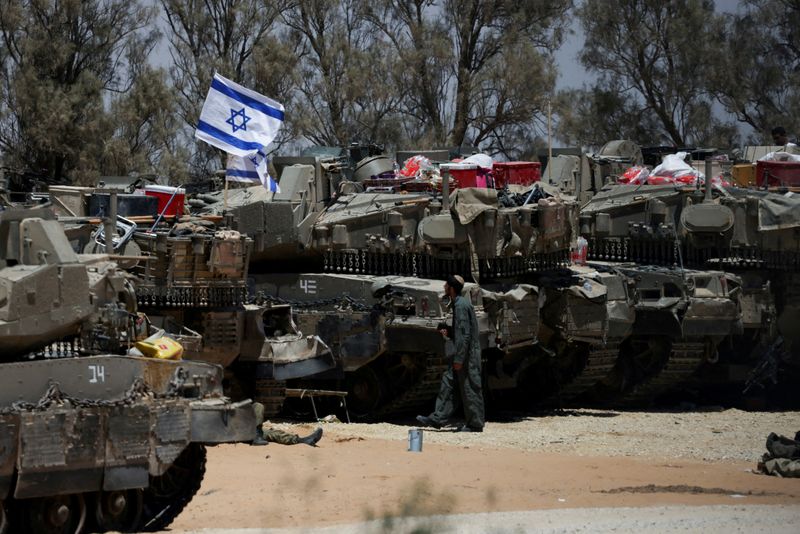By Humeyra Pamuk and Mike Stone
WASHINGTON (Reuters) – The Biden administration has sent to Israel large numbers of munitions, including more than 10,000 highly destructive 2,000-pound bombs and thousands of Hellfire missiles, since the start of the war in Gaza, said two U.S. officials briefed on an updated list of weapons shipments.
Between the war’s start last October and recent days, the United States has transferred at least 14,000 of the MK-84 2,000-pound bombs, 6,500 500-pound bombs, 3,000 Hellfire precision-guided air-to-ground missiles, 1,000 bunker-buster bombs, 2,600 air-dropped small-diameter bombs, and other munitions, according to the officials, who were not authorized to speak publicly.
While the officials didn’t give a timeline for the shipments, the totals suggest there has been no significant drop-off in U.S. military support for its ally, despite international calls to limit weapons supplies and a recent administration decision to pause a shipment of powerful bombs.
Experts said the contents of the shipments appear consistent with what Israel would need to replenish supplies used in this eight-month intense military campaign in Gaza, which it launched after the Oct. 7 attack by Palestinian Hamas militants who killed 1,200 people and took 250 others hostage, according to Israeli tallies.
“While these numbers could be expended relatively quickly in a major conflict, this list clearly reflects a substantial level of support from the United States for our Israeli allies,” said Tom Karako, a weapons expert at the Center for Strategic and International Studies, adding that the listed munitions were the type Israel would use in its fight against Hamas or in a potential conflict with Hezbollah.
The delivery numbers, which have not been previously reported, provide the most up-to-date and extensive tally of munitions shipped to Israel since the Gaza war began.
Israel and Iran-backed Hezbollah have been trading fire since the start of the Gaza war, and concern is rising that an all-out war could break out between the two sides.
The White House declined to comment. Israel’s Embassy in Washington did not immediately respond to a request for comment.
The shipments are part of a bigger list of weapons sent to Israel since the Gaza conflict began, one of the U.S. officials said. A senior Biden administration official on Wednesday told reporters that Washington has since Oct. 7 sent $6.5 billion worth of security assistance to Israel.
Israeli Prime Minister Benjamin Netanyahu in recent weeks claimed that Washington was withholding weapons, a suggestion U.S. officials have repeatedly denied even though they acknowledged some “bottlenecks”.
The Biden administration has paused one shipment of the 2,000-pound bomb, citing concern over the impact it could have in densely populated areas in Gaza, but U.S. officials insist that all other arms deliveries continue as normal. One 2,000-pound bomb can rip through thick concrete and metal, creating a wide blast radius.
Reuters reported on Thursday that the United States is discussing with Israel the release of a shipment of large bombs that was suspended in May over worries about the military operation in Rafah.
International scrutiny of Israel’s military operation in Gaza has intensified as the Palestinian death toll from the war has exceeded 37,000, according to the Gaza health ministry, and has left the coastal enclave in ruins.
Washington gives $3.8 billion in annual military assistance to its longtime ally. While Biden has warned that he would place conditions on military aid if Israel fails to protect civilians and allow more humanitarian aid into Gaza, he has not done so beyond delaying the May shipment.
Biden’s support for Israel in its war against Hamas has emerged as a political liability, particularly among young Democrats, as he runs for re-election this year. It fueled a wave of “uncommitted” protest votes in primaries and has driven pro-Palestinian protests at U.S. universities.
While the United States provides detailed descriptions and quantities of military aid sent to Ukraine as it fights a full-scale invasion of Russia, the administration has revealed few details about the full extent of U.S. weapons and munitions sent to Israel.
The shipments are also hard to track because some of the weapons are shipped as part of arms sales approved by Congress years ago but only now being fulfilled.
One of the U.S. officials said the Pentagon has sufficient quantities of weapons in its own stocks and had been liaising with U.S. industry partners who make the weapons, such as Boeing (NYSE:) Co and General Dynamics (NYSE:), as the companies work to manufacture more.
(This story has been corrected to fix the reference to $6.5 billion worth of US ‘security assistance’ to Israel instead of ‘weapons’ in paragraph 9)






